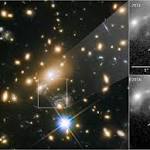Nasa's Hubble telescope captures image of Icarus, farthest star ever seen
Nasa's Hubble Space Telescope has discovered the farthest individual star ever seen - an enormous blue stellar body nicknamed Icarus located over halfway across the universe.
The star, harboured in a very distant spiral galaxy, is so far away that its light has taken nine billion years to reach Earth. It appears to us as it did when the universe was about 30 per cent of its current age.
Normally, the star would be too faint to view, even with the world's largest telescopes.
However, through a phenomenon called gravitational lensing that tremendously amplifies the star's feeble glow, astronomers were able to pinpoint this faraway star and set a new distance record.
"This is the first time we're seeing a magnified, individual star," said Patrick Kelly, who led the study as a postdoctoral fellow University of California at Berkeley.
"You can see individual galaxies out there, but this star is at least 100 times farther away than the next individual star we can study, except for supernova explosions," said Kelly, who is no at the University of Minnesota in the US..jpg)